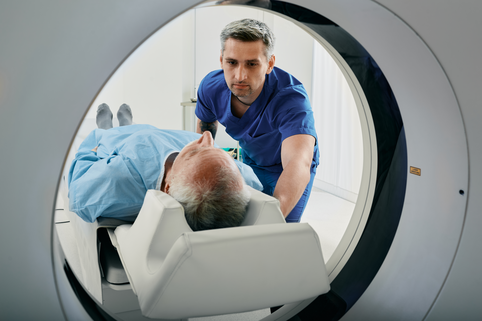For help in finding a physician, making appointments and general information call Riverside Nurse.
1-800-675-6368For help in finding a physician, making appointments and general information call Riverside Nurse.
1-800-675-6368
A Low Dose CT scan (LDCT) is a quick and painless exam that uses a small amount of radiation to detect tiny spots in the lungs, called lung nodules.
Lung cancer typically shows no signs until later stages, but with a LDCT we can detect lung cancer in the earliest stages, before you start to feel any symptoms. If found at Stage 1A the five-year survival rate is greater than 90%.
Finding a lung nodule doesn’t necessarily mean that you have cancer, but it does mean that you need expert care, fast.
Lung nodules are small spots or shadows seen on routine Low Dose CT screenings or discovered unexpectedly during other imaging scans. The vast majority of nodules are not cancerous, however some may be early signs of lung cancer, which is why expedited access to our expert pulmonologists are so important.
Riverside’s Lung Nodule Clinic is a dedicated program designed to ensure every patient with a suspicious lung nodule greater than 6mm receives rapid, expert care. Riverside has lung nodule clinics in Newport News, Gloucester, Williamsburg and on the Eastern Shore. We're committed to evaluating patients within 7 days of referral, because we know the earlier lung cancer is detected the better the outcome.
When you come to our Lung Nodule Clinic, you’ll meet with one of our expert pulmonary physicians who will:
Based on this comprehensive evaluation, your pulmonologist will determine next steps, which may include:
Our Lung Nodule Clinic’s timely, coordinated, expert-driven approach plays an essential role in detecting lung cancer at its earliest stages, when treatment is most effective and survival rates are the highest.
Riverside’s Lung Nodule Clinic is diagnosing more lung cancers at earlier stages than ever before. That means more patients can receive curative treatments and more lives are being saved.
Lung cancer often doesn’t show any signs or symptoms in until later stages. Talk with your health care provider if you notice:
Smoking remains the greatest risk factor for lung cancer, but there are other factors that increase your risk.
The risk of lung cancer increases with the number of cigarettes you smoke each day and the number of years you have smoked. Quitting at any age can significantly lower your risk of developing lung cancer.
To see if you meet the criteria for a LDCT, your primary care provider will ask you about your smoking history, which is measured in “pack years”. A 20 pack year or more history of smoking is key criteria for LDCT. Smoking one pack a day for 20 years, or two packs a day for 10 years, both equal 20 pack years.
Even if you have smoked for years, quitting now can still make a big difference for your health.
Radon is produced by the natural breakdown of uranium in soil, rock and water that eventually becomes part of the air you breathe. Unsafe levels of radon can accumulate in any building, including homes. Radon testing kits, which can be purchased at home improvement stores, can determine whether levels are safe. If unsafe levels are discovered, remedies are available.